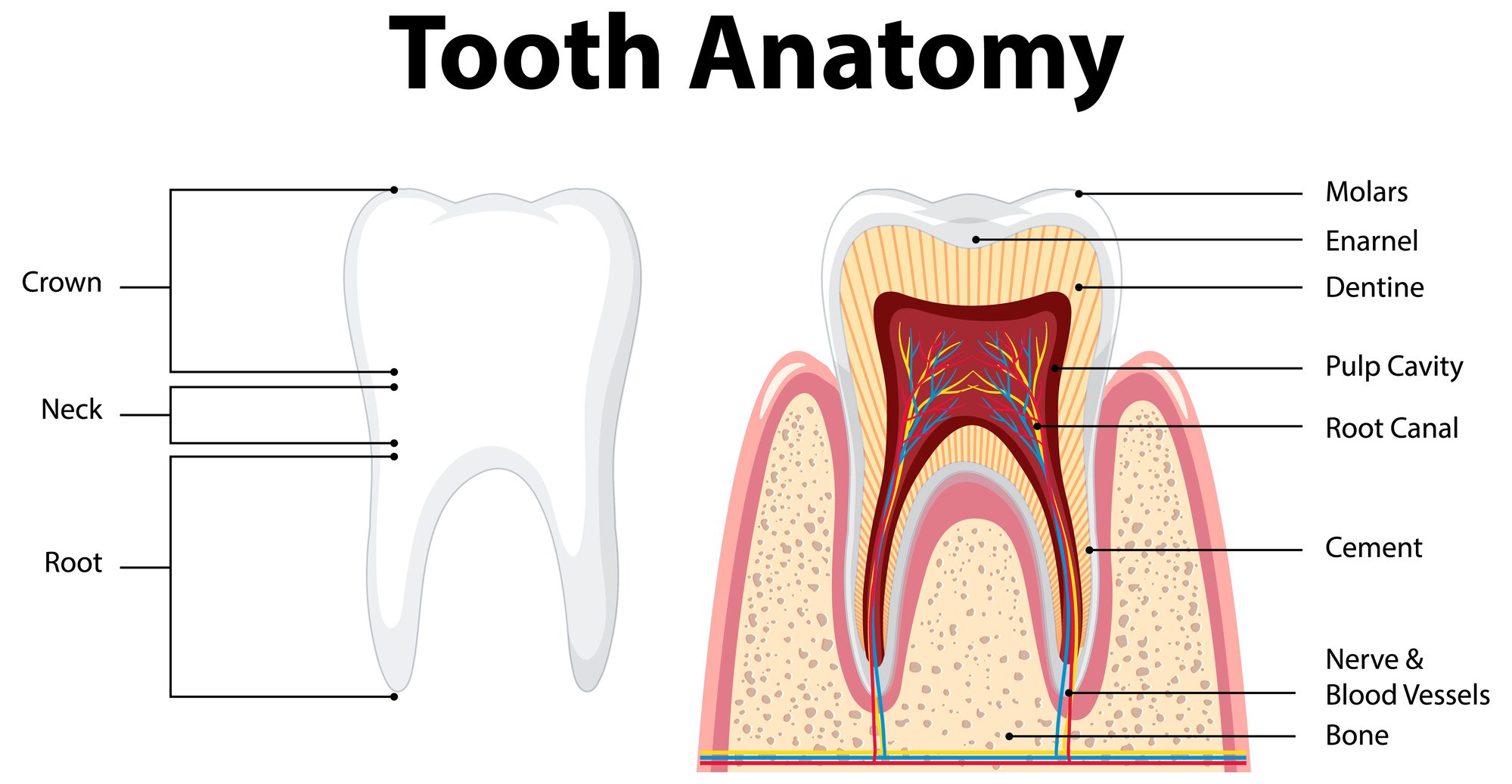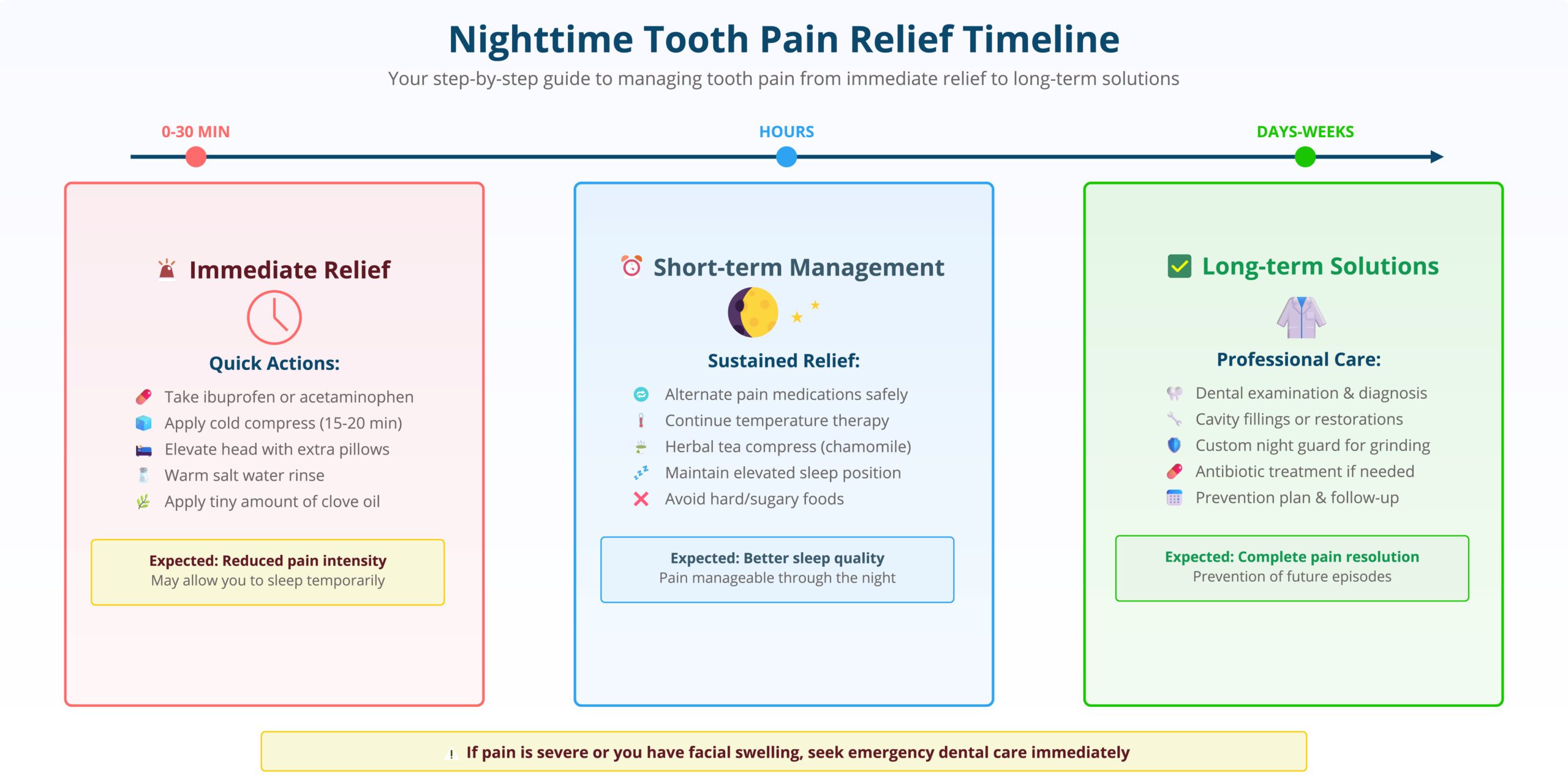It’s 2 AM, and you’re wide awake with a throbbing toothache that seems to pulse with every heartbeat. You’ve tried everything – switching positions, taking pain relievers, even that old trick of holding cold water in your mouth – but nothing seems to help. Sound familiar?
You’re definitely not alone in this midnight struggle. At Patient Empowered Dentistry in Eastpointe, we understand how frustrating nighttime tooth pain can be, especially when it keeps you from getting the rest you need.
The good news? There are real, scientific reasons why your toothache hurts more at night, and more importantly, there are effective ways to find relief both immediately and long-term.
Why Tooth Pain Gets Worse at Night

Before we dive into solutions, let’s understand what’s actually happening in your mouth when you lie down to sleep. It’s not just your imagination – there are legitimate physiological reasons why dental pain intensifies after dark.
Blood Flow Changes When You Lie Down
When you’re upright during the day, gravity helps regulate blood flow throughout your body. But when you lie flat to sleep, more blood rushes to your head and mouth area. This increased blood flow creates extra pressure around sensitive teeth and inflamed gums, turning a manageable ache into that familiar throbbing sensation that matches your heartbeat.
Think of it like this: if you have a cut on your finger and hold it above your heart, it doesn’t throb as much. But lower it below your heart level, and you’ll feel that pulsing sensation immediately.
Fewer Distractions = More Focus on Pain
During the day, your brain processes countless distractions – work stress, conversations, phone notifications, and daily activities. These distractions naturally compete with pain signals for your brain’s attention.
At night, however, your environment becomes quiet and still. Without these natural distractions, your brain has nothing else to focus on except the pain signals coming from your tooth. The pain isn’t necessarily worse – you’re just more aware of it.
Your Mouth Environment Changes
While you sleep, your mouth produces less saliva. Since saliva helps neutralize harmful bacteria and wash away food particles, reduced saliva production allows bacteria to multiply more freely. If you have existing tooth decay or gum disease, this bacterial increase can worsen inflammation and intensify pain.
Additionally, if you grind your teeth at night (which many people do without realizing), you’re putting extra pressure on already sensitive areas.

Common Causes of Nighttime Tooth Pain
Understanding what’s causing your specific pain helps us determine the right treatment approach. Here are the most common culprits behind those sleepless nights:
Tooth Decay and Cavities
Untreated cavities are often the main cause of nighttime tooth pain. When decay reaches the inner layers of your tooth where the nerves live, that increased blood flow we talked about puts extra pressure on already irritated nerve endings.
Late-night snacking (especially sugary treats) can make cavity pain worse by feeding the bacteria that cause decay, leading to increased acid production and sensitivity.
Teeth Grinding (Bruxism)
Many people unknowingly grind or clench their teeth during sleep, often due to stress or an uneven bite. This puts tremendous pressure on your teeth and jaw muscles.
Signs you might be grinding include waking up with a sore jaw, morning headaches, worn-looking teeth, or your partner hearing grinding sounds at night.
Gum Disease and Infections
Gum disease starts quietly but can progress to painful infections that worsen at night. Advanced gum disease can even lead to abscesses – serious infections that require immediate treatment.
The inflammation from gum disease becomes more noticeable when that extra blood flow hits your gums during sleep.
Sinus Pressure and Infections
Your upper teeth sit very close to your sinus cavities. When sinuses become inflamed from allergies, colds, or infections, they can put pressure on your tooth roots, causing pain that feels exactly like a toothache.
This type of pain often affects multiple upper teeth and typically worsens when you lie down.
Cracked or Damaged Teeth
Sometimes tooth cracks are so small you can’t see them, but you’ll definitely feel them. These hairline fractures expose sensitive inner tooth layers to pressure and temperature changes.
During the day, minor cracks might only cause occasional discomfort. But at night, that increased blood pressure and any teeth grinding can turn a small crack into a major source of pain.
Damaged Dental Work
Old fillings, crowns, or other dental work can break down over time, creating sharp edges or exposing sensitive tooth structure. What might feel like minor irritation during the day can become significant pain when you’re lying down.
Sometimes a filling that’s too high can also cause pain when you bite down, especially noticeable when teeth grinding occurs during sleep.
When Nighttime Tooth Pain Becomes an Emergency
While some tooth pain can wait until morning, certain symptoms indicate you need immediate professional attention. Don’t try to tough it out if you’re experiencing serious warning signs.
⚠️ Seek Emergency Care If You Experience:
- Severe pain that doesn’t respond to over-the-counter medication – This could indicate a serious infection
- Facial swelling, especially around your jaw or cheek – Signs that infection may be spreading
- Fever along with tooth pain – Your body’s fighting a significant infection
- Difficulty swallowing or opening your mouth – These can be signs of a severe abscess
- Bad taste in your mouth with persistent pain – Often indicates an abscessed tooth
- Recent facial trauma causing tooth pain – The tooth may be damaged or knocked loose
Dental infections can become serious quickly, so don’t wait if you’re experiencing these symptoms. Call our emergency line or visit an emergency room if we’re not available.
Immediate Relief Strategies for Tonight

When tooth pain strikes in the middle of the night, you need solutions that work now. While these aren’t permanent fixes, they can help you get through until you can see us for proper treatment.
Adjust Your Sleep Position
Remember that blood flow issue? Use it to your advantage by keeping your head elevated while you sleep. Try these positioning strategies:
- Add an extra pillow or two to prop up your head
- Use a wedge pillow if you have one available
- Aim for about a 45-degree angle – not completely upright, but not flat either
- Try to sleep on the side opposite your painful tooth
Many of our patients find this simple change alone helps them get through the night more comfortably.
Safe Pain Management
Over-the-counter pain relievers can provide significant relief when used correctly:
- Ibuprofen is particularly effective for dental pain because it reduces inflammation
- Follow package directions exactly – never exceed recommended doses
- Acetaminophen can be alternated with ibuprofen for additional relief (consult dosing guidelines)
- Take medication with food to prevent stomach irritation
Never place aspirin directly on your gums – it can actually burn the tissue and make things worse.
Temperature Therapy
Cold therapy can numb pain and reduce swelling around the affected area:
- Apply a cold compress or ice pack wrapped in a thin towel to the outside of your cheek
- Use for 15-20 minutes at a time, then take a break
- Never apply ice directly to your tooth or gums
- If cold makes the pain worse, try room temperature or slightly warm compresses instead
Gentle Home Remedies
Several natural approaches can provide temporary relief:
- Salt water rinse: Mix 1/2 teaspoon salt in warm water and gently swish for 30 seconds
- Clove oil: Apply a tiny amount to a cotton ball and dab on the affected tooth (use sparingly – it’s potent!)
- Peppermint tea bags: Cool slightly and apply as a compress
- Over-the-counter numbing gels: Follow package instructions carefully
Remember, these are temporary measures to help you sleep – they don’t replace professional dental care.
Professional Treatment Options
The best way to stop nighttime tooth pain permanently is to address the underlying cause. At Patient Empowered Dentistry, we’ll work with you to identify what’s causing your pain and create a treatment plan that fits your needs and comfort level.
For Cavities and Decay
Modern cavity treatment is much more comfortable than you might remember:
- Small cavities: Simple tooth-colored fillings that blend seamlessly with your natural teeth
- Larger decay: Inlays, onlays, or crowns to restore strength and function
- Deep decay: Root canal therapy to save the tooth and eliminate pain permanently
We use the latest techniques and comfort measures to make your treatment as pleasant as possible.
For Teeth Grinding
If grinding is causing your nighttime pain, we can help protect your teeth:
- Custom night guards: Comfortable, precisely-fitted protection that prevents grinding damage
- Bite adjustment: Minor reshaping to eliminate pressure points
- Stress management resources: Since stress often contributes to grinding
A custom night guard is like a protective cushion for your teeth while you sleep.
For Gum Disease and Infections
We offer comprehensive gum disease treatment options:
- Professional cleaning: To remove bacteria and tartar buildup
- Scaling and root planing: Deep cleaning to treat moderate gum disease
- Antibiotic therapy: To eliminate bacterial infections
- Surgical options: For advanced cases that need more intensive treatment
Early treatment often means simpler, more comfortable solutions.
Preventing Future Nighttime Tooth Pain
The best treatment is prevention. These strategies can help you avoid those midnight dental emergencies:
Optimize Your Nighttime Routine
What you do before bed directly impacts your dental health:
- Brush thoroughly for two full minutes before sleep
- Floss every night to remove bacteria between teeth
- Avoid late-night snacking, especially sugary or acidic foods
- Use fluoride mouthwash to strengthen enamel overnight
- Stay hydrated to maintain healthy saliva production
Regular Professional Care
Consistent dental visits are your best defense against serious problems:
- Every six months for cleanings and exams to catch issues early
- Professional fluoride treatments to strengthen teeth
- Regular assessment of existing dental work
- Early intervention for small problems before they become painful
Research shows that patients who maintain regular dental visits experience significantly fewer dental emergencies.
Your Path to Pain-Free Nights
Nighttime tooth pain doesn’t have to be something you just endure. Understanding why it happens and knowing what to do about it puts you back in control of your comfort and sleep quality.
At Patient Empowered Dentistry, we’re committed to not just treating your pain, but helping you understand your oral health so you can make informed decisions about your care. We know dental anxiety is real, and we’re here to make your experience as comfortable and stress-free as possible.
Whether you need immediate relief from a painful emergency or want to prevent future problems with regular care, we’re here to help. Don’t let another sleepless night pass wondering “why does my toothache hurt at night?”
Contact our Eastpointe office today to schedule your appointment, or book online for your convenience. Your comfortable, pain-free nights are just one appointment away!
